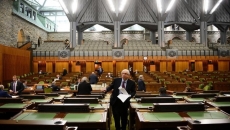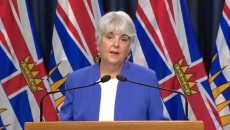Canada's national shipbuilding plan was rocked by yet another cost increase on Monday as the federal government revealed it will pay $4.1 billion for two long-overdue support ships for the navy — an increase of $1.5 billion from initial estimates.
The revelation came as Ottawa officially awarded a contract for the full construction of the two new Protecteur-class joint support ships to Vancouver's Seaspan shipyards, which has already started work on the first of the vessels.
Seaspan was first tapped to build the two ships and several coast guard vessels in 2011, at which point the supply ships were expected to cost $2.6 billion. The figure was later revised to $3.4 billion before another $700 million was added Monday.
The first of the support ships was to have been delivered by 2019. The government says it now doesn't expect the first ship before 2023, with the second due in 2025. Seaspan has been under contract to work on some parts of the first ship since June 2018.
The Royal Canadian Navy has been without a full-time support ship since 2014 and is currently relying on a converted civilian vessel that is being leased from Quebec's Chantier Davie shipyard to fill the gap.
That ship, the MV Asterix, was at the heart of the failed prosecution of retired vice-admiral Mark Norman.
The Liberal government was playing down the cost increase to the support ships on Monday, with senior ministers touting the importance of the vessels to the Royal Canadian Navy and the jobs that the project is creating in Vancouver and elsewhere.
"These new ships will provide a necessary capability for our Royal Canadian Navy, while providing significant economic benefits and jobs to Canadians, including thousands of jobs created or sustained," Defence Minister Harjit Sajjan said in a statement.
Yet the cost increase is the latest to hit the shipbuilding plan, which has been plagued by delays and budget increases for years. The plan is intended to recapitalize the majority of Canada's naval and coast guard fleets.
The entire plan to buy new warships to replace the navy's frigates and destroyers, several Arctic patrol vessels, a polar icebreaker and four science vessels for the Canadian Coast Guard in addition to the two support ships was pegged in 2011 at $35 billion.
The warships alone are now expected to cost at least $65 billion while the rest of the projects have either seen similar budget increases or their budgets are under review. The delivery schedules for the projects have also been pushed back numerous times.
Defence analyst David Perry of the Canadian Global Affairs Institute noted the new cost for the support ships is almost exactly how much Parliament's budget watchdog estimated following an analysis in 2013.
The Conservative government at the time refuted the parliamentary budget officer's estimate, with then-public works minister Rona Ambrose saying appropriate safeguards had been put into place to protect taxpayers.
"There's not a lot of detail in this today so it's hard to do a line by line," Perry said. "But superficially at least, the PBO's report from 2013 — which I recall being pooh-poohed pretty extensively — has held up pretty well."
Ottawa has in recent years produced update cost estimates for most of the vessels being built through the federal shipbuilding plan. However, budgets for the polar icebreaker and an offshore science vessel for the coast guard are still under review.






